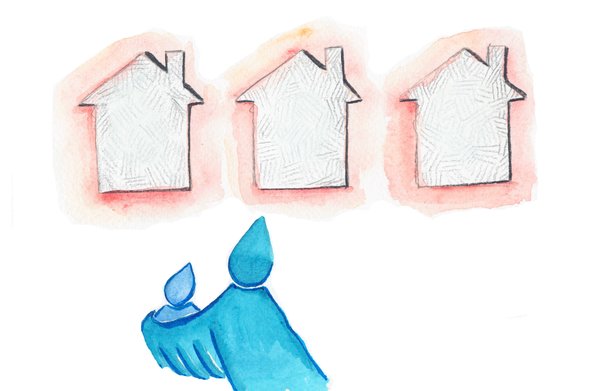
Credit Illustration by Abigail Gray Swartz
“Can you tell me again, Mommy? Can you tell me who decides whether I get to stay here?”
I turn to see my 4-year-old foster son staring at our house through the back window of my car. We’ve just returned from dropping my 5-year-old biological son, Ryan, off at school, and I’m not surprised he’s asking me again now. It is a conversation we have several times a week and almost always when it is just the two of us, alone together.
“The judge, honey. The judge is the boss, and he is working very hard to figure out what is best for you.”
“Can we call him? Can we tell him I want to stay here?”
For more than 10 months, my husband, Mike, and I have been foster parents to this little boy, whom I’ve been calling BlueJay in this diary to protect his privacy. For most of those months, it seemed very possible that he and his brothers, who do not live in our home, would be reunited with their biological parents. His parents haven’t made enough progress toward reunification, though. As their time runs out, it seems the most likely scenario is that he will be moved to live with relatives who live several hours away.
It could happen in a matter of weeks or even days. In our experience as a new foster family, good information can be hard to come by, so we simply wait for the next court hearing. Mike and I have become used to the waiting. We have learned how to manage — or at least compartmentalize — our anxiety about the future’s uncertainty. But as our foster son gets older, his anxiety over the uncertainty only grows.
His questions have become more direct in recent weeks. Generalized reassurances aren’t cutting it for him anymore. He’s 4 years old, he is perceptive, and he wants answers.
We have struggled with how much to tell him. A year ago, I never would have imagined I’d be having these kinds of conversations with a child so young. But after a persistent and specific line of questioning about whether we would let him stay with us forever or if we would make him leave, we knew he needed — he deserved — some deeper answers. He needed to know about the judge.
“No, we can’t call the judge,” I told him. “I’m sorry about that. I know it’s hard to wait. All the grown-ups are working together to help the judge figure this out. Us, your mom and dad,” the extended family members, the social workers. “We all love you very much.”
“I love you. I love this house. This is my house.”
“Of course it is, honey.”
He’s right. It is his house as much as it is mine or Mike’s or Ryan’s. He has a favorite spot on the couch and a usual spot at the dining room table. He has his own bedroom, his own toys and games, his own set of books, his own nightlight. He has stomped up the stairs of this home in frustration, danced across the dining room floor and run down the hallway more times than any of us could count.
As he gets older and is able to process his memories at a higher level, he becomes more and more conscious that a “home” isn’t always permanent.
I want him to know we would never pack him up simply because he threw a really big tantrum or broke something out of anger or spoke too disrespectfully. This is a fear of his that is rooted in his experience. And yet, it is possible that once it is decided he will leave, he will be required to leave very quickly.
We have done our best to advocate for a reasonable transition plan that would prepare our foster son for wherever he may go from here. Change scares him. It makes his little heart practically beat right out of his chest. He deserves the time and effort needed to help him adjust to another move. He deserves to see all the grown-ups who love him working together on the same team. His team.
Since I can’t promise him he will stay, and no one else will promise me that he’ll be granted an opportunity to ease into his next home, I do the only thing I can think to do. I try to plant the seeds of change in a way that prepares him for the possibility of it without adding to his fear.
“Mommy, what are the judge’s choices?”
I take a breath and allow myself a quick moment to be proud of him and the way he has come to grasp the concept of decisions and consequences. This boy who just months ago struggled to understand the simple cause and effect rules of childhood. Things like, if you throw a toy, that toy will be put away for the rest of the day.
“Well, the judge has three choices. He might choose for you to stay here. Or he might choose for you to live with your mom or dad. Or he might choose for you to live with” the other relatives. “All of those choices are good choices, because all of those homes are full of love.”
“O.K., Mommy. O.K., I understand.”
As we head into the house together, I wonder when he will ask me again. Maybe tomorrow or maybe even later the same day. He will ask again if he can stay with us forever or if we can call the judge. I suspect that he both understands more than we think he does, and that he’s more confused than we could ever know.
When he asks again, I will answer him again. I will try to keep my words simple and clear and reassuring. I will focus on the only thing I know for sure — that he is loved.







